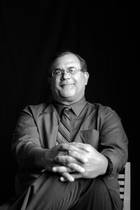
Richard N. Velotta
Related content
What looked like a routine lease deal between the Las Vegas Convention and Visitors Authority and the Las Vegas 51s mushroomed into something much bigger.
At an LVCVA board meeting, there were accusations, power plays and the threat of losing professional baseball in Las Vegas, plus appearances by a descendent of one of baseball’s greats and the caretakers of a company named for a historic business figure.
Ultimately, it was decided that the Summerlin Las Vegas Baseball Club, a partnership between majority stakeholder Howard Hughes Corp. and businessman Steven Mack, will be allowed to negotiate a 10-year lease for the Cashman Field stadium. That means Summerlin can acquire — for $20.5 million — the Las Vegas 51s minor-league baseball team from businessman Derek Stevens, who is a partner in the D and Golden Gate resorts downtown.
Hughes Corp. CEO David Weinreb made the case for the lease, telling the LVCVA board he wanted the assurance of the team having a home for at least 10 years — a term that had been offered to previous owners of minor-league teams playing at the 9,334-seat stadium.
Pacific Coast League President Branch Rickey said Stevens was being forced by the league to sell the team because the league didn’t want it owned by someone with gambling interests. Rickey is the grandson of the man who helped Jackie Robinson break the color barrier in 1947.
But the two representatives of Las Vegas, Mayor Carolyn Goodman and Councilman Steve Ross, hesitated.
To understand why, one has to know a little about Cashman Field itself. The city owns the 57 acres that house the stadium, convention center and theater. The facility is managed by the LVCVA at the direction of the Nevada Legislature.
In recent years, the city has issued requests for proposals for a better use for its land. The Hughes Corp. agreed to be a resource to find a tenant.
If changes are made to Cashman Field, the buyer or tenant has to provide a new facility for the baseball team. That’s likely a deal-killer considering it would cost millions.
Rickey pleaded with the board to approve the lease to expedite the sale of the team. He told members another prospective buyer would move the 51s out of Las Vegas.
Goodman and Ross said they had discussions with Hughes executives about sharing the costs of upgrading Cashman Field. But Hughes responded the way any tenant would. The executives told their landlord: That’s your responsibility, not ours.
Without a new tenant, upgrading the stadium would fall to the LVCVA and carry a price tag of up to $50 million.
So the board faced a losing prospect either way: spend millions on upgrades that might be used only for a few seasons or lose the team.
The ultimate goal for Hughes is to help the city find a new tenant for Cashman, thereby requiring that new tenant to build a new stadium for the team, presumably next to the Shops at Summerlin, the mall project near the Beltway and Charleston Avenue. Hughes is the primary developer of Summerlin.
The lease deal may have been the ultimate squeeze play.